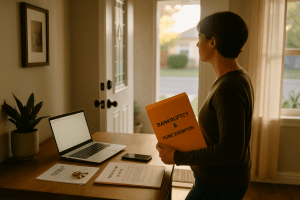
Will I Lose My House If I File Bankruptcy? What Homeowners Should Know
Will I Lose My House If I File Bankruptcy Under Chapter 7 or 13? Will I lose my house if
Error: Contact form not found.
Lorem ipsum dolor sit amet, consectetur adipiscing elit. Ut elit tellus, luctus nec ullamcorper mattis, pulvinar dapibus leo.
Will I lose my house if I file bankruptcy? This is one of the most common concerns for homeowners facing financial hardship. While bankruptcy does carry risks, some homeowners may be able to keep their homes, depending on how exemptions and repayment plans apply to their situation.
Whether you’re filing Chapter 7 or Chapter 13, certain legal protections may apply depending on your circumstances and how the process is handled.
When you file for bankruptcy, the court issues an automatic stay—a legal order that immediately stops foreclosure, collection calls, and lawsuits. This gives you breathing room to assess your options and prepare your next steps.
Every state (and federal law) provides a homestead exemption, which protects a certain amount of home equity from creditors. If your equity is within the exemption limit, your home may not be subject to liquidation in Chapter 7, depending on the facts of your case.
Examples:
If you’re asking “will I lose my house if I file bankruptcy,” the first step is calculating your home’s equity and comparing it to the available exemption.
In Chapter 7, also called liquidation bankruptcy:
In Chapter 13, you create a 3- to 5-year repayment plan:
If you’re behind on payments, Chapter 13 may be an option worth discussing with a licensed attorney, depending on your financial situation.
Even if protections are available, certain factors may still put your home at risk:
This is why it’s essential to assess your financial picture before filing and to ask, honestly, “Will I lose my house if I file bankruptcy under these conditions?”
Will I lose my house if I file bankruptcy? Not necessarily. If your equity is exempt and your mortgage is current, keeping your home may be possible. Chapter 13 provides different legal tools that may apply to homeowners who are behind on payments. Understanding your options and exemptions is key to making the right decision.
Still unsure whether you’ll keep your home? The team at Bankruptcy Attorneys can help you understand exemptions, evaluate your mortgage status, and choose the right filing strategy. Get a free evaluation today to discuss how bankruptcy laws may apply to your home and financial situation
Yes. Filing triggers an automatic stay that halts foreclosure while your case is reviewed.
In Chapter 7, the trustee may sell the home. In Chapter 13, you can repay the non-exempt portion through your plan and keep the property.
Yes. Chapter 13 allows you to catch up on past-due mortgage payments over time.
Possibly. In Chapter 13, if your home’s value is less than the first mortgage, a second mortgage may be stripped as unsecured debt.
Investment properties may not be protected under homestead exemptions and are more likely to be liquidated in Chapter 7.
Attorney Advertising. This site is a legal marketing service and does not provide legal advice. Submitting information does not create an attorney-client relationship. Results are not guaranteed.

Will I Lose My House If I File Bankruptcy Under Chapter 7 or 13? Will I lose my house if
| Cookie | Duration | Description |
|---|---|---|
| cookielawinfo-checkbox-analytics | 11 months | This cookie is set by GDPR Cookie Consent plugin. The cookie is used to store the user consent for the cookies in the category "Analytics". |
| cookielawinfo-checkbox-functional | 11 months | The cookie is set by GDPR cookie consent to record the user consent for the cookies in the category "Functional". |
| cookielawinfo-checkbox-necessary | 11 months | This cookie is set by GDPR Cookie Consent plugin. The cookies is used to store the user consent for the cookies in the category "Necessary". |
| cookielawinfo-checkbox-others | 11 months | This cookie is set by GDPR Cookie Consent plugin. The cookie is used to store the user consent for the cookies in the category "Other. |
| cookielawinfo-checkbox-performance | 11 months | This cookie is set by GDPR Cookie Consent plugin. The cookie is used to store the user consent for the cookies in the category "Performance". |
| viewed_cookie_policy | 11 months | The cookie is set by the GDPR Cookie Consent plugin and is used to store whether or not user has consented to the use of cookies. It does not store any personal data. |